- Home
- Julia Quinn
To Sir Phillip, With Love Page 2
To Sir Phillip, With Love Read online
Page 2
The carriage came to a halt, and a gentleman hopped down, but his back was to the house, and I could see nothing of him other than his height (average) and his hair (dark). He then reached up and assisted a lady down.
Dulcie Brougham!
“What is she doing here?” I said indignantly.
And then, once Dulcie had both feet safely on the ground, the gentleman aided another young lady, then another. And then another.
“Did he bring all of the Brougham girls?” my mother asked.
“Apparently so.”
“I thought they hated him.”
I shook my head. “Apparently not.”
The reason for the sisters’ about-face became clear a few moments later, when Gunning announced their arrival.
I do not know what Cousin Charles used to look like, but now…well, let us just say that any young lady would find him pleasing. His hair was thick and with a bit of wave, and even from across the room, I could see that his eyelashes were ridiculously long. His mouth was the sort that always looks as if it is about to smile, which in my opinion is the best sort of mouth to have.
I am not saying that I felt anything other than polite interest, but the Brougham sisters were falling all over themselves to be the one on his arm.
“Dulcie,” my mother said, walking forth with a welcoming smile. “And Antonia. And Sarah.” She took a breath. “And Cordelia, too. What a pleasant surprise to see all of you.”
It is a testament to my mother’s skills as a hostess that she did indeed sound pleased.
“We could not let dear Cousin Charles come over by himself,” Dulcie explained.
“He does not know the way,” added Antonia.
It could not have been a simpler journey—one had only to ride into the village, turn right at the church, and it was only another mile until our drive.
But I did not say this. I did, however, look over at Mr. Brougham with some sympathy. It could not have been an entertaining drive.
“Charles, dear,” Dulcie was saying, “this is Lady Crane, and Miss Amanda Crane.”
I bobbed a curtsy, wondering if I was going to have to climb into that carriage with all five of them. I hoped not. If it was hot in here, it would be beastly in the carriage.
“Lady Crane, Amanda,” Dulcie continued, “my dear cousin Charles, Mr. Farraday.”
I cocked my head at that. My mother was correct—his name was not Brougham. Oh dear, did that mean he was related to Mrs. Brougham? I found Mr. Brougham the more sensible of the two.
Mr. Farraday bowed politely, and for the briefest of moments, his eyes caught mine.
I should say at this point that I am not a romantic. Or at least I do not think I am a romantic. If I were, I would have gone to London for that season. I would have spent my days reading poetry and my nights dancing and flirting and making merry.
I certainly do not believe in love at first sight. Even my parents, who are as much in love as anyone I know, tell me that they did not love each other instantly.
But when my eyes met Mr. Farraday’s…
As I said, it was not love at first sight, since I do not believe in such things. It was not anything at first sight, really, but there was something…a shared recognition…a sense of humor. I’m not certain how to describe it.
I suppose, if pressed, that I would say it was a sense of knowing. That somehow I already knew him. Which was of course ridiculous.
But not as ridiculous as his cousins, who were trilling and frilling and fluttering about. Clearly they had decided that Cousin Charles was no longer a beast, and if anyone was going to marry him, it was going to be one of them.
“Mr. Farraday,” I said, and I could feel the corners of my mouth pinching in an attempt to hold back a smile.
“Miss Crane,” he said, wearing much the same expression. He bent over my hand and kissed it, much to the consternation of Dulcie, who was standing right next to me.
Again, I must stress that I am not a romantic. But my insides did a little flip when his lips touched my skin.
“I am afraid that I am dressed for a ride,” I told him, motioning to my riding habit.
“So you are.”
I glanced ruefully at his cousins, who were most assuredly not dressed for any sort of athletic endeavor. “It’s such a lovely day,” I murmured.
“Girls,” my mother said, looking squarely at the Brougham sisters, “why don’t you join me while Amanda and your cousin go for a ride? I did promise your mother that she would show him the area.”
Antonia opened her mouth to protest, but she was no match for Eloise Crane, and indeed she did not make even a sound before my mother added, “Oliver will be down shortly.”
That settled it. They sat, all four of them, in a neat row on the sofa, descending as one, with identically placid smiles on their faces.
I almost felt sorry for Oliver.
“I did not bring my mount,” Mr. Farraday said regretfully.
“That is no matter,” I replied. “We have an excellent stables. I’m certain we can find something suitable.”
And off we went, out the drawing-room door, then out of the house, then around the corner to the back lawn, and then—
Mr. Farraday sagged against the wall, laughing. “Oh, thank you,” he said, with great feeling. “Thank you. Thank you.”
I was not sure if I should feign ignorance. I could hardly acknowledge the sentiment without insulting his cousins, which I did not wish to do. As I have mentioned, I do not dislike the Brougham sisters, even if I found them a bit ridiculous that afternoon.
“Tell me you can ride,” he said.
“Of course.”
He motioned to the house. “None of them can.”
“That’s not true,” I replied, puzzled. I knew I had seen them on horseback at some point.
“They can sit in a saddle,” he said, his eyes flashing with what could only be a dare, “but they cannot ride.”
“I see,” I murmured. I considered my options and said, “I can.”
He looked at me, one corner of his mouth tilted up. His eyes were a rather nice shade of green, mossy with little brown flecks. And again, I got that odd sense of being in accord.
I hope I am not being immodest when I say that there are a few things I do quite well. I can shoot with a pistol (although not with a rifle, and not as well as my mother, who is freakishly good). I can add up sums twice as quickly as Oliver, provided I have pen and paper. I can fish, and I can swim, and above all, I can ride.
“Come with me,” I said, motioning toward the stables.
He did, falling into step beside me. “Tell me, Miss Crane,” he said, his voice laced with amusement, “with what were you bribed for your presence this afternoon?”
“You think your company was not enough reward?”
“You did not know me,” he pointed out.
“True.” We turned onto the path toward the stables, and I was happy to feel that the breeze was picking up. “As it happens, I was outmaneuvered by my mother.”
“You admit to being outmaneuvered,” he murmured. “Interesting.”
“You don’t know my mother.”
“No,” he assured me, “I am impressed. Most people would not confess to it.”
“As I said, you don’t know my mother.” I turned to him and smiled. “She is one of eight siblings. Besting her in any sort of devious matter is nothing short of a triumph.”
We reached the stables, but I paused before entering. “And what about you, Mr. Farraday?” I asked. “With what were you bribed for your presence this afternoon?”
“I, too, was thwarted,” he said. “I was told I’d escape my cousins.”
I let out a snort of laughter at that. Inappropriate, yes, but unavoidable.
“They attacked just as I was departing,” he told me grimly.
“They are a fierce lot,” I said, utterly deadpan.
“I was outnumbered.”
“I thought they didn’t like you,�
�� I said.
“So did I.” He planted his hands on his hips. “It was the only reason I consented to the visit.”
“What exactly did you do to them when you were children?” I asked.
“The better question would be—what did they do to me?”
I knew better than to claim that he held the upper hand because of his gender. Four girls could easily trounce one boy. I had gone up against Oliver countless times as a child, and although he would never admit it, I bested him more often than not.
“Frogs?” I asked, thinking of my own childhood pranks.
“That was me,” he admitted sheepishly.
“Dead fish?”
He didn’t speak, but his expression was clearly one of guilt.
“Which one?” I asked, trying to imagine Dulcie’s horror.
“All of them.”
I sucked in my breath. “At the same time?”
He nodded.
I was impressed. I suppose most ladies would not find such things attractive, but I have always had an unusual sense of humor. “Have you ever done a flour ghosting?” I asked.
His eyebrows rose, and he actually leaned forward. “Tell me more.”
And so I told him about my mother, and how Oliver and I had tried to scare her off before she’d married my father. We’d been utter beasts. Truly. Not just mischievous children, but utter and complete blights on the face of humanity. It’s a wonder my father hadn’t shipped us off to a workhouse. The most memorable of our stunts was when we’d rigged a bucket of flour above her door so that it would dust her when she stepped out into the hall.
Except that we’d filled the bucket quite high, so it was more of a coating than a dusting, and in fact more of a deluge than anything else.
We also hadn’t counted on the bucket hitting her on the head.
When I said that my current mother’s entry into our lives had saved us all, I meant it quite literally. Oliver and I were so desperate for attention, and our father, as lovely as he is now, had no idea how to manage us.
I told all this to Mr. Farraday. It was the strangest thing. I have no idea why I spoke so long and said so much. I thought it must be that he was an extraordinary listener, except that he later told me that he is not, that in fact he is a dreadful listener and usually interrupts too often.
But he didn’t with me. He listened, and I spoke, then I listened, and he spoke, and he told me of his brother Ian, with his angelic good looks and courtly manners. How everyone fawned over him, even though Charles was the elder. How Charles never could manage to hate him, though, because when all was said and done, Ian was a rather fine fellow.
“Do you still want to go for a ride?” I asked, when I noticed that the sun had already begun to dip in the sky. I could not imagine how long we had been standing there, talking and listening, listening and talking.
To my great surprise Charles said no, let’s walk instead.
And we did.
It was still warm later that night, and so after supper was done, I took myself outside. The sun had sunk below the horizon, but it was not yet completely dark. I sat on the steps of the back patio, facing west so I could watch the last hints of daylight turn from lavender to purple to black.
I love this time of the night.
I sat there for quite some time, long enough so that the stars began to appear, long enough so that I had to hug my arms to my body to ward off the chill. I hadn’t brought a shawl. I suppose I hadn’t thought I’d be sitting outside for so long. I was just about to head back inside when I heard someone approaching.
It was my father, on his way home from his greenhouse. He was holding a lantern, and his hands were dirty. Something about the sight of him made me feel like a child again. He was a big bear of a man, and even before he’d married Eloise, back when he didn’t seem to know what to say to his own children, he’d always made me feel safe. He was my father, and he would protect me. He didn’t need to say it, I just knew.
“You’re out late,” he said, sitting beside me. He set his lantern down and brushed his hands against his work trousers, shaking off the loose dirt.
“Just thinking,” I replied.
He nodded, then leaned his elbows on his thighs and looked out at the sky. “Any shooting stars tonight?”
I shook my head even though he wasn’t facing me. “No.”
“Do you need one?”
I smiled to myself. He was asking if I had any wishes to be made. We used to wish on stars together all the time when I was small, but somehow we’d got out of the habit.
“No,” I said. I was feeling introspective, thinking about Charles and wondering what it meant that I’d spent the whole of the afternoon with him and now could not wait to see him again tomorrow. But I didn’t feel as if I needed any wishes granted. At least, not yet.
“I always have wishes,” he remarked.
“You do?” I turned to him, my head tilting to the side as I took in his profile. I know that he’d been terribly unhappy before he’d met my current mother, but that was all well behind him. If ever a man had a happy and fulfilled life, it was he.
“What do you wish for?” I asked.
“The health and happiness of my children, first and foremost.”
“That doesn’t count,” I said, feeling myself smile.
“Oh, you don’t think so?” He looked at me, and there was more than a hint of amusement in his eyes. “I assure you, it’s the first thing I think about in the morning, and the last before I lay myself down to sleep.”
“Really?”
“I have five children, Amanda, and every one of them is healthy and strong. And as far as I know, you’re all happy. It’s probably dumb luck that you’ve all turned out so well, but I’m not going to tempt any fates by wishing for something else.”
I thought about that for a moment. It had never occurred to me to wish for something I already had. “Is it scary being a parent?” I asked.
“The most terrifying thing in the world.”
I don’t know what I thought he might say, but it wasn’t that. But then I realized—he was speaking to me as an adult. I don’t know if he’d ever really done so before. He was still my father, and I was still his daughter, but I’d crossed some mysterious threshold.
It was thrilling and sad at the same time.
We sat together for a few minutes more, pointing out constellations and not saying anything of import. And then, just when I was about to head back inside, he said, “Your mother said that you had a gentleman caller this afternoon.”
“And four of his female cousins,” I quipped.
He looked over at me with arched brows, a silent scolding for making light of the topic.
“Yes,” I said. “I did.”
“Did you like him?”
“Yes.” I felt myself grow a bit light, as if my insides had gone fizzy. “I did.”
He digested that, then said, “I’m going to have to get a very large stick.”
“What?”
“I used to say to your mother that when you were old enough to be courted, I was going to have to beat away the gentlemen.”
There was something almost sweet about that. “Really?”
“Well, not when you were very small. Then you were such a nightmare I despaired of anyone ever wanting you.”
“Father!”
He chuckled. “Don’t say you don’t know it’s true.”
I couldn’t contradict.
“But when you were a bit older, and I started to see the first hints of the woman you would become…” He sighed. “Good Lord, if ever being a parent is terrifying…”
“And now?”
He thought about that for a moment. “I suppose now I can only hope I raised you well enough to make sensible decisions.” He paused. “And, of course, if anyone even thinks about mistreating you, I shall still have that stick.”
I smiled, then scooted over slightly, so that I could rest my head on his shoulder. “I love you, Fathe
r.”
“I love you, too, Amanda.” He turned and kissed me on the top of my head. “I love you, too.”
I did marry Charles, by the way, and my father never once had to brandish a stick. The wedding occurred six months later, after a proper courtship and slightly improper engagement. But I am certainly not going to put into writing any of the events that made the engagement improper.
My mother insisted upon a premarital chat, but this was conducted the night before the wedding, by which time the information was no longer exactly timely, but I did not let on. I did, however, get the impression that she and my father might also have anticipated their marriage vows. I was shocked. Shocked. It seems most unlike them. Now that I have experienced the physical aspects of love, the mere thought of my parents…
It is too much to bear.
Charles’s family home is in Dorset, rather close to the sea, but as his father is very much alive, we have let a home in Somerset, halfway between his family and mine. He dislikes town as much as I do. He is thinking of beginning a breeding program for horses, and it’s the oddest thing, but apparently the breeding of plants and the breeding of animals are not entirely dissimilar. He and my father have become great friends, which is lovely, except that now my father visits quite often.
Our new home is not large, and all of the bedrooms are quite near to one another. Charles has devised a new game he calls, “See how quiet Amanda can be.”
Then he proceeds to do all measure of wicked things to me—all while my father sleeps across the hall!
He is devil, but I adore him. I can’t help it. Especially when he…
Oh, wait, I wasn’t going to put any such things in writing, was I?
Just know that I am smiling very broadly as I remember it.
And that it was not covered in my mother’s premarital chat.
I suppose I should admit that last night I lost the game. I was not quiet at all.
My father did not say a word. But he departed rather unexpectedly that afternoon, citing some sort of botanical emergency.
I don’t know that plants have emergencies, but as soon as he left, Charles insisted upon inspecting our roses for whatever it was my father said was wrong with his.
Except that for some reason he wanted to inspect the roses that were already cut and arranged in a vase in our bedroom.

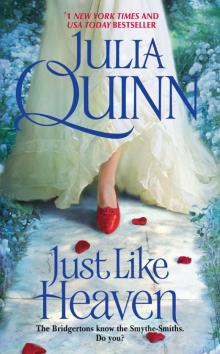 Just Like Heaven
Just Like Heaven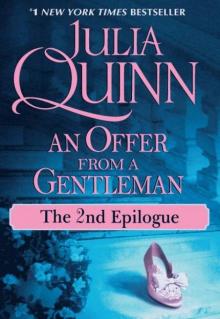 B03.2 An Offer from a Gentleman Ep II
B03.2 An Offer from a Gentleman Ep II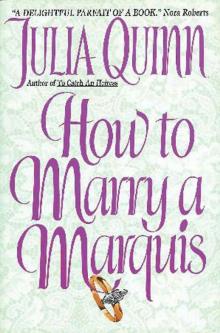 How to Marry a Marquis
How to Marry a Marquis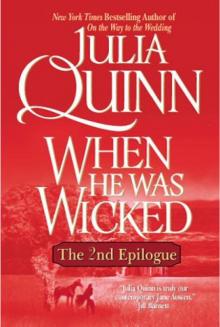 When He Was Wicked: The 2nd Epilogue
When He Was Wicked: The 2nd Epilogue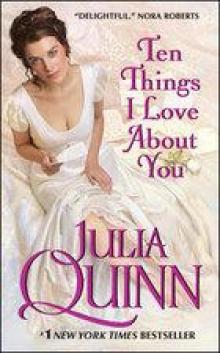 Ten Things I Love About You
Ten Things I Love About You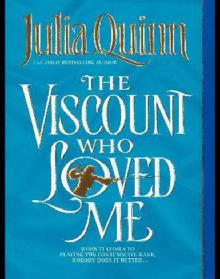 The Viscount Who Loved Me
The Viscount Who Loved Me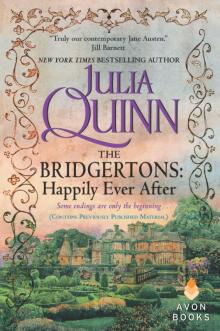 The Duke and I
The Duke and I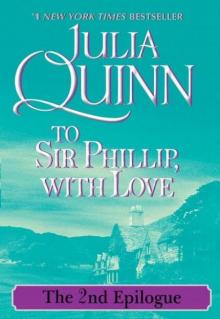 B05.2 To Sir Philip With Love Ep II
B05.2 To Sir Philip With Love Ep II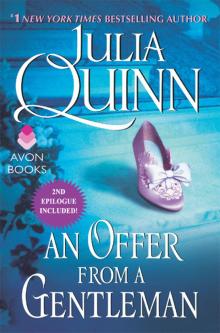 An Offer From a Gentleman: The 2nd Epilogue
An Offer From a Gentleman: The 2nd Epilogue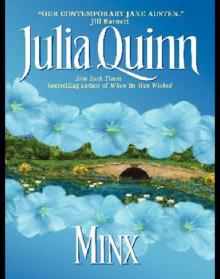 Minx
Minx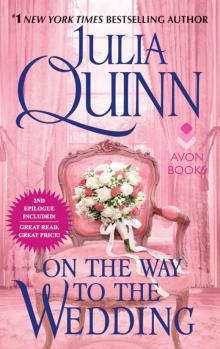 On the Way to the Wedding with 2nd Epilogue
On the Way to the Wedding with 2nd Epilogue Mr. Cavendish, I Presume
Mr. Cavendish, I Presume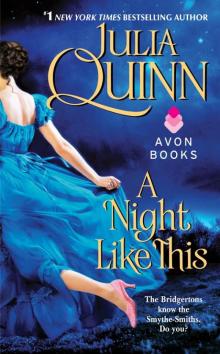 A Night Like This
A Night Like This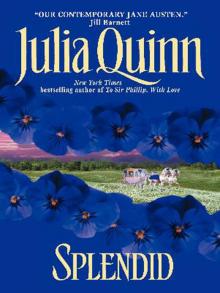 Splendid
Splendid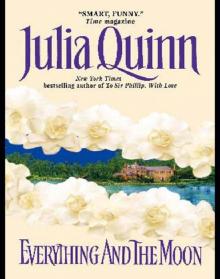 Everything and the Moon
Everything and the Moon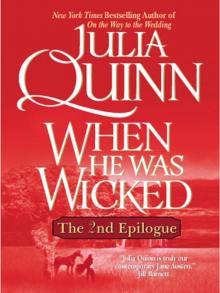 When He Was Wicked
When He Was Wicked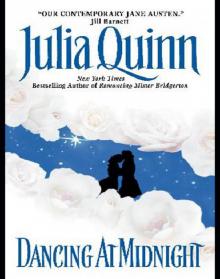 Dancing at Midnight
Dancing at Midnight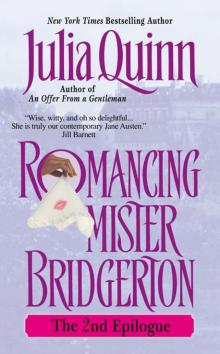 Bridgerton 04: 2nd Epilogue - Romancing Mister Bridgerton
Bridgerton 04: 2nd Epilogue - Romancing Mister Bridgerton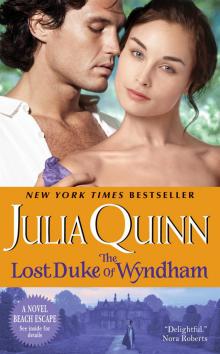 The Lost Duke of Wyndham
The Lost Duke of Wyndham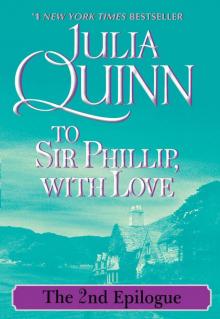 To Sir Phillip, With Love
To Sir Phillip, With Love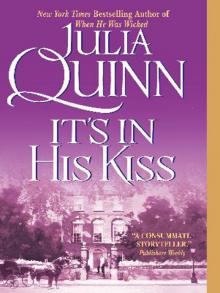 It's in His Kiss
It's in His Kiss The Other Miss Bridgerton
The Other Miss Bridgerton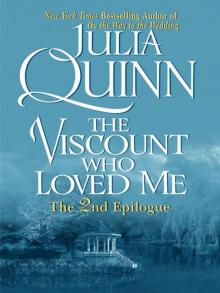 Bridgerton 02: 2nd Epilogue - The Viscount Who Loved Me
Bridgerton 02: 2nd Epilogue - The Viscount Who Loved Me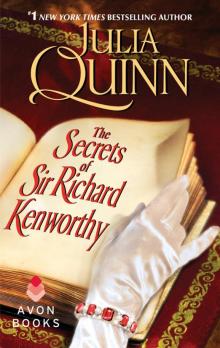 The Secrets of Sir Richard Kenworthy
The Secrets of Sir Richard Kenworthy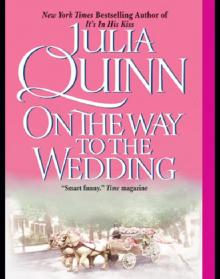 On the Way to the Wedding
On the Way to the Wedding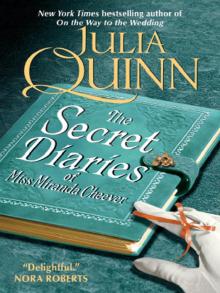 The Secret Diaries of Miss Miranda Cheever
The Secret Diaries of Miss Miranda Cheever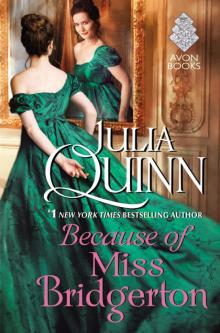 Because of Miss Bridgerton
Because of Miss Bridgerton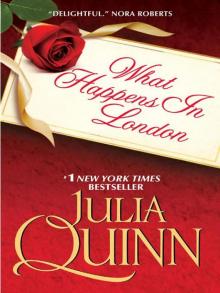 What Happens in London
What Happens in London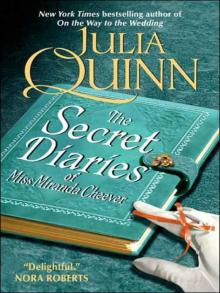 JQuinn - The Secret Diaries of Miss Miranda Cheever
JQuinn - The Secret Diaries of Miss Miranda Cheever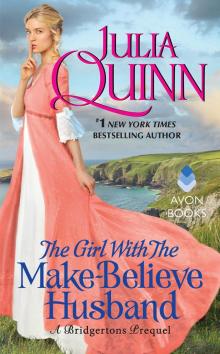 The Girl With the Make-Believe Husband
The Girl With the Make-Believe Husband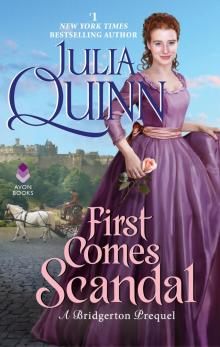 First Comes Scandal
First Comes Scandal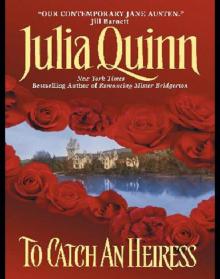 To Catch an Heiress
To Catch an Heiress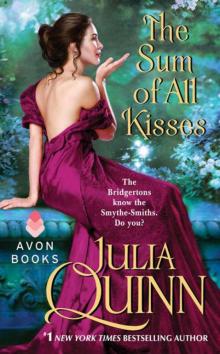 The Sum of All Kisses
The Sum of All Kisses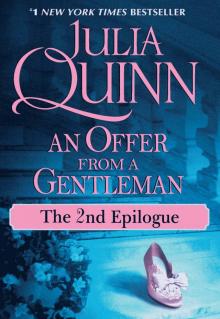 An Offer From a Gentleman
An Offer From a Gentleman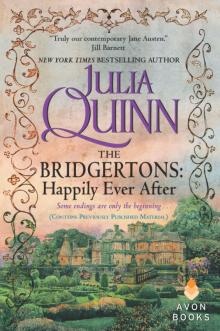 The Bridgertons: Happily Ever After
The Bridgertons: Happily Ever After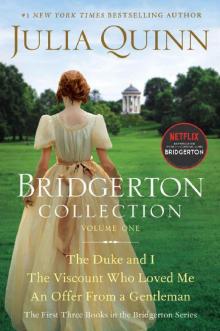 Bridgerton Collection Volume 1 (Bridgertons)
Bridgerton Collection Volume 1 (Bridgertons)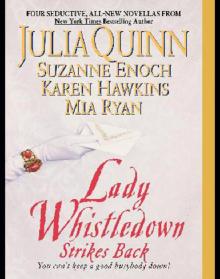 Lady Whistledown Strikes Back
Lady Whistledown Strikes Back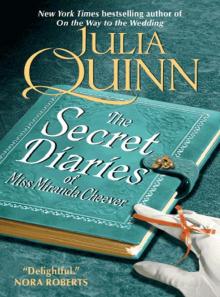 Secret Diaries of Miss Miranda Cheever
Secret Diaries of Miss Miranda Cheever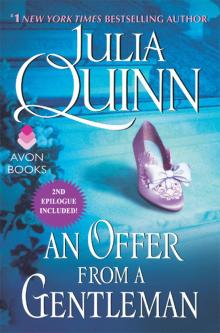 An Offer from a Gentleman with 2nd Epilogue
An Offer from a Gentleman with 2nd Epilogue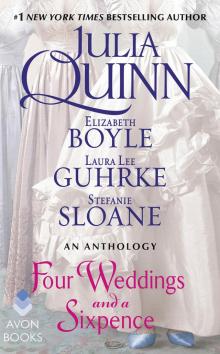 Four Weddings and a Sixpence
Four Weddings and a Sixpence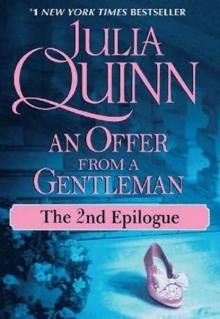 An Offer from a Gentleman: The Epilogue II
An Offer from a Gentleman: The Epilogue II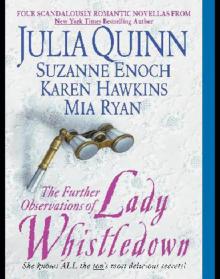 The Further Observations of Lady Whistledown
The Further Observations of Lady Whistledown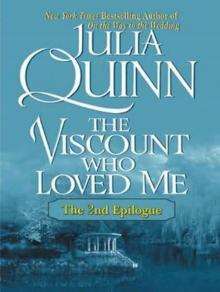 The Viscount Who Loved Me: The Epilogue II
The Viscount Who Loved Me: The Epilogue II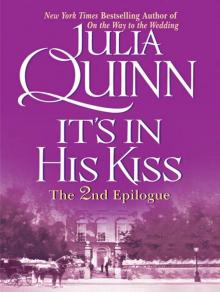 It’s In His Kiss Epilogue II
It’s In His Kiss Epilogue II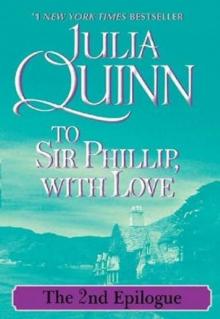 To Sir Phillip, with Love: The Epilogue II
To Sir Phillip, with Love: The Epilogue II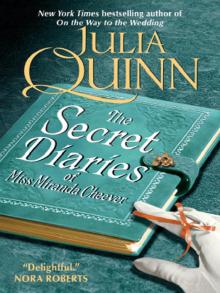 The Secret Diaries of Miss Miranda Cheevers
The Secret Diaries of Miss Miranda Cheevers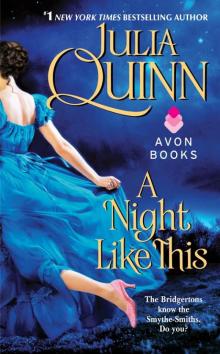 A Night Like This (Smythe-Smith Quartet)
A Night Like This (Smythe-Smith Quartet)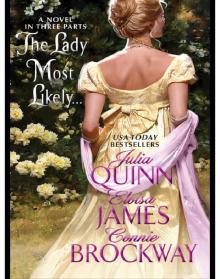 The Lady Most Likely...
The Lady Most Likely...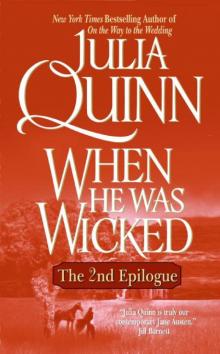 Bridgerton 06: 2nd Epilogue - When He Was Wicked
Bridgerton 06: 2nd Epilogue - When He Was Wicked Just Like Heaven sq-1
Just Like Heaven sq-1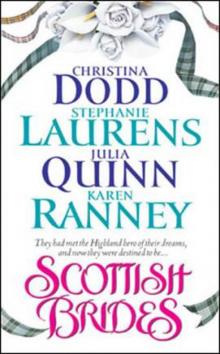 Gretna Greene
Gretna Greene